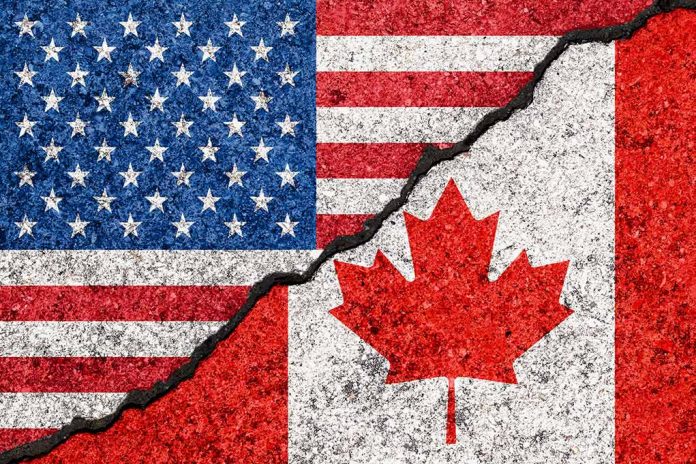
Canadian Prime Minister Mark Carney has denounced President Trump’s new 25% tariff on foreign-made car imports as a “direct attack” on Canadian workers, signaling a growing rift in US-Canada trade relations that could reshape North America’s automotive industry.
Key Takeaways
- President Trump imposed a permanent 25% tariff on all imported vehicles not manufactured in the United States, effective April 2nd, with exemptions for US-made parts.
- Canadian Prime Minister Mark Carney called the tariffs a “direct attack” on Canadian workers and has announced retaliatory measures.
- The United Auto Workers union has supported Trump’s tariff, viewing it as beneficial for American autoworkers.
- Approximately 50% of cars sold in the US are manufactured domestically, with the remainder largely imported from Mexico and Canada under the trilateral free trade agreement.
- Canada has allowed companies to delay tax payments while implementing countermeasures to protect its automotive industry.
Trump’s New Auto Tariffs Strain US-Canada Relations
President Trump’s decision to impose a 25% tariff on all vehicles not made in the United States has created significant tension with America’s northern neighbor. The permanent tariff, which takes effect on April 2nd, exempts US-made parts from the tax but otherwise applies broadly to foreign-made vehicles. The move appears designed to pressure automakers to relocate their manufacturing operations to American soil, potentially creating more jobs for US workers but likely increasing vehicle prices for consumers in the near term.
The tariff announcement comes at a particularly sensitive time for Canada’s automotive industry, which is deeply integrated with US manufacturing through long-established supply chains under the trilateral free trade agreement between the US, Mexico, and Canada. While approximately half of all vehicles sold in the United States are already manufactured domestically, the remainder largely come from these neighboring countries, making them vulnerable to the new trade barriers.
Carney’s Strong Response to Protect Canadian Workers
Standing near the Ambassador Bridge connecting Windsor, Ontario, to Detroit, Michigan, Prime Minister Mark Carney delivered a forceful rebuke of the tariffs while meeting with autoworkers and labor leaders. He emphasized the symbolic and economic importance of this crossing, which has long represented the close commercial ties between the two nations. Carney has pledged that funds collected from Canada’s retaliatory tariffs would be directed toward supporting affected workers in the automotive sector. According to Carney, “This is a direct attack, to be clear, a direct attack on the very workers that I stood in front of, Unifor workers I stood in front of this morning at the Ambassador Bridge, a bridge that is a symbol and a reality up until now, of the tight ties between our two countries, ties of kinship, ties of commerce, ties that are in the process of being broken.”
The Prime Minister has made defending Canadian economic interests a central focus of his campaign for the upcoming April 28 elections. While acknowledging that the tariffs would undoubtedly harm Canada’s economy, he has stressed the importance of national unity and resilience in the face of these challenges. Canada has already announced its plans to implement retaliatory tariffs and is exploring additional trade options to mitigate the impact on its automotive industry.
Contrasting Views on the Tariff’s Impact
The United Auto Workers union in the United States has expressed support for Trump’s tariff, viewing it as potentially beneficial for American autoworkers. The union has urged automakers to bring union jobs back to the US in response to the new trade policy. Meanwhile, President Trump has justified the tariffs by suggesting they will encourage manufacturers to consolidate their operations.
The Canadian government has implemented measures to help domestic companies adjust to the changing trade landscape, including allowing them to delay tax payments temporarily. This approach reflects Canada’s pragmatic recognition of the need for self-reliance while still pursuing cooperation when possible. Ontario’s Premier has also fully backed the Canadian tariff response, demonstrating unified provincial and federal opposition to Trump’s policy.
Sources:
- Canada will react to Trump’s ‘attack’ soon, could impose tariffs, says Carney
- Canadian PM Mark Carney calls Trump’s new auto tariffs ‘a direct attack’
- Canada PM dubs US auto tariffs ‘direct attack’




